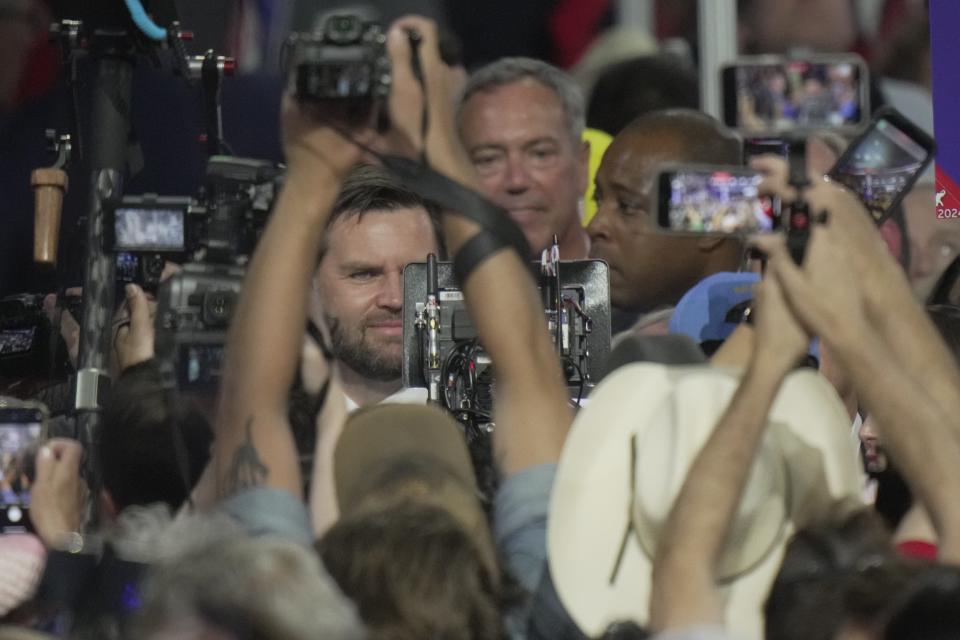Vance will hurt Trump's reelection chances. Ohio junior senator isn't ready to be VP.
- Oops!Something went wrong.Please try again later.
- Oops!Something went wrong.Please try again later.
Ohioans know J.D. Vance as their junior United states senator. After being chosen as former President Donald Trump’s running mate today, Americans may soon know Vance as their vice president.
What will Americans think of J.D. Vance?
One might expect Americans to know him well already. Vance gained fame as the author of "Hillbilly Elegy: A Memoir of a Family and Culture in Crisis," a 2016 best-seller that was later turned into a Netflix movie.
Since then, he has been a ubiquitous media presence – first as a “Never Trump” Republican in 2016, and later as the ultimate Trump loyalist, able and willing to articulate the MAGA message on outlets ranging from far-right podcasts to Sunday network talk shows.
Vance won a high-profile Senate race in 2022, following a competitive Republican primary, on the strength of Trump’s endorsement.``
America does not know J.D. Vance
Yet polls show that many Americans have never heard of Vance or have no opinion of him – including two-thirds of swing-state voters. Believe it or not, that’s fairly typical for recent vice-presidential candidates.
For example, only 39 percent of Americans expressed opinions about Mike Pence and Tim Kaine after they were announced as Trump’s and Hillary Clinton’s running mates, respectively, in 2016.
Let us know: What do you think of Trump’s VP pick in Sen. JD Vance?
That is why Vance’s vice-presidential “roll-out”– from Wednesday’s announcement and convention speech to upcoming campaign events and media interviews – will be so important. Many voters are forming their first impressions of the Middletown native right now.
And that could make a difference in November.
Vance can't sway voters
As a political scientist who studies vice-presidential candidates, I am guided by data from past elections. Those data point toward two important conclusions about Vance’s candidacy.
First, Vance will have limited appeal to voters outside the Republican Party base. This is partly because Vance often conducts himself as a hysterical partisan – for example, by claiming that the Biden campaign was “directly” to blame for Saturday’s assassination attempt against Trump before any facts about the shooter were known.
Another factor is the increasing unpopularity of vice presidential candidates in recent years.
Today is not just some isolated incident.
The central premise of the Biden campaign is that President Donald Trump is an authoritarian fascist who must be stopped at all costs.
That rhetoric led directly to President Trump's attempted assassination.— J.D. Vance (@JDVance1) July 14, 2024
In 2020, Pence and Kamala Harris were rated more negatively, on a 100-point scale, than all but one running mate from their respective parties since 1968. Partisan opponents rated Pence and Harris lower than any of their predecessors, by 15 points. But the same candidates received the highest ratings on record from members of their own party.
In this polarized political climate, running mates tend to be wildly popular among co-partisans, despised by their opponents and received coolly by independents. We should expect the same for Vance.
Vance may hurt Trump
Second, Vance probably will not help Trump win—and might cost him votes.
My book with Kyle C. Kopko, "Do Running Mates Matter?," shows that vice-presidential candidates have very little direct influence on voters, even ones who come from the same state or belong to the same demographic group.
For example, Vance’s selection is unlikely to gain Trump votes in Ohio or among Catholics. Rather, running mates have mostly indirect effects, by influencing voters’ perceptions of the presidential candidate.

This was evident in 2008. Voters who doubted Sarah Palin’s readiness to be president also came to doubt John McCain’s judgment, and, in turn, were less likely to support him.
Conversely, voters’ confidence in Joe Biden’s qualifications boosted perceptions of Barack Obama’s judgment and won him additional votes.
Vance is not up for the job
J.D. Vance is the least-qualified vice-presidential candidate in modern memory. Elected to public office for the first time in late 2022, he began serving in the United States Senate only in January of last year.
Voters are unlikely to believe that Vance, a 39-year-old freshman senator, is ready to take over the vice presidency, or – with an assassination attempt on the 78-year-old Trump fresh in mind – possibly even the presidency, just six months from now.
They will know that Trump had far more credible options, including Sen. Marco Rubio and Gov. Doug Burgum, and ask why these men were passed over for Vance.
Voters may conclude that Trump, in a second term, will not be focused on enacting his legislative agenda, or advancing the national interest, but pursuing “retribution” against his opponents, with a proven loyalist at his side who would, for example, “have the courage” to do what former Vice President Mike Pence would not on Jan. 6, 2021.
This may appeal to Trump, but it is unlikely to appeal to voters, many of whom will find their worst fears about the former president confirmed by Vance’s selection.
Christopher J. Devine is an associate professor of political science at the University of Dayton. He is the author of "Do Running Mates Matter? The Influence of Vice Presidential Candidates in Presidential Elections” (with Kyle C. Kopko) and “I’m Here to Ask for Your Vote: How Presidential Campaign Visits Influence Voters.” This column first appeared in the Columbus (Ohio) Dispatch.
This article originally appeared on The Columbus Dispatch: Who is JD Vance? Trump VP pick isn't ready to be vice president

